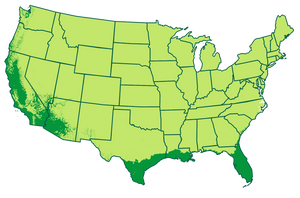* Images shown are of mature plants

Have questions? Talk with our Plant Experts (800) 973-8959
The All-In-One Citrus Tree for Every Home and Patio
Why Meyer Lemon Trees?
Meyer Lemons are different from the small, tart and acidic lemons at your grocery store because the fruit is literally a cross between traditional sour lemons and sweet oranges – yes, you get both sweet and savory flavors from each squeeze of this world-beating fruit!
As you know, the fruit available at your grocery store is not chosen for flavor but rather shelf life – that is why the lemons available to you are small with very thick skin. Meyer Lemons are not available in grocery stores because the fruit skin is so wonderfully thin that it would bruise while riding in a crate – however, the thin skin is perfect for home chefs that want tantalizingly fresh fruit right off the branch! The thin skin allows the citrus juices to develop fully, making it the perfect raw fruit for juices, desserts, and flavoring.
Can I grow it? YES, YOU CAN! The Meyer Lemon Tree has remarkable cold and heat tolerance so anyone in the country can grow it – if your winters get cold, simply bring your Meyer Lemon Tree indoors for the winter. Our trees max out at around 8 feet so you don’t have to worry about them out-growing your space. And when you bring it indoors, you can enjoy the jasmine-citrus fragrance throughout those long winter months. If your sun exposure or growing conditions are less than ideal, then we recommend you start with one of our larger trees. They're already at a heavy fruiting size, with well-developed branching structures. Some of these trees have been grown for up to 4-5 years and have fruited for several seasons.
Place your order NOW and have your own Meyer Lemon Tree delivered right to your door.
Looking for that unique gift? Look no further! It’s the gift that truly keeps on giving – a memorable keepsake to commemorate holidays, housewarmings, birthdays, bereavements – this tree will produce fruit for decades and every time someone picks a lemon they will think of you!
Why Fast-Growing-Trees.com is Better
Are all Meyer Lemon Trees equal? No! A Meyer Lemon Tree from Fast Growing Trees is different:
• Our Meyer Lemon Trees are greenhouse-grown. We control how much light, heat, and water the trees receive to ensure you get the best tree imaginable- many trees that we ship to customers already have fruit on them!
• Our Meyer Lemon Trees are grown in their existing pots. Unlike the violent process of digging a tree out of the ground, our trees are nurtured to full potential without disrupting the roots so you receive the happiest and healthiest tree available.
• Fast Growing Trees only sells the “Improved” Meyer Lemon variety – the only cultivar that has proven disease-resistant capabilities.
• When you order our larger-sized Meyer Lemon Tree, you can look forward to faster fruiting...even in the first year of growth! Our larger sizes are perfect for those who don't want to wait to harvest delicious lemons.
You’ve heard the chatter, now it’s time to try for yourself – this is the tree that so many home chefs have been successful with – start enjoying that sweet fruit immediately and order yours today!
Pollination Info
Meyer Lemon Tree Pollination
Meyer Lemon Trees are self-fertile. You will get fruit with only one plant. However, adding an additional Meyer Lemon Tree will drastically increase the size of your crop.
Planting & Care
1. Planting: It is best to plant the Improved Meyer Lemon Tree in a warm, sunny area where the soil drains well. Six hours (or more) of direct sun is best for the tree. Planting next to a house or under an eave will provide some frost protection. Remember to water the Improved Meyer Lemon Tree deeply once every seven to ten days in midsummer (newly planted trees may need more frequent watering until established), and water less often if it rains or if the weather is cool.
If you're planting in a container, select one that is 1 to 2 pot sizes larger than what it initially arrived. Fill the bottom of your pot with a 2-inch layer of crushed stone to improve drainage. Then, fill with soil, 2 inches of compost, water well, and place near a South-facing window.
*Note: The leaves of the Meyer Lemon can be toxic to pets.
2. Watering: Allow the soil to dry down to 2 inches between waterings.
While the roots prefer to stay on the dry side, citrus leaves love humidity. Indoor Citrus will do best if misted daily, especially when you are running your heat during cooler months. You can also use a humidifier or fill your pot's saucer with rocks and add water; place your plant on the rocks ensuring the bottom of the pot is above the waterline.
3. Pollination: For indoor plants, simply take a small, dry, fine-tipped paintbrush and stick it into the center of the bloom. Swirl it around and collect the pollen on the brush. Go to the next bloom and repeat the process until every bloom has been treated. Do this once daily and don’t wash the paintbrush until after the blooms have been pollinated. The bloom will fall off naturally and the fruit will begin to form.
4. Fertilizing: Fertilize regularly with a high-nitrogen blend each month between April and September.
FGT Tip: Yellowing leaves may indicate the need for more fertilizer.
5. Pruning: Prune as needed to maintain your Lemon Tree's shape. Clip off any branches that are too long. Remove branches growing toward the trunk of the tree instead of away from it. This will maintain airflow between the branches.
Related Resources
Plant Care 101: Meyer Lemon Tree
The leaves are changing, the temperatures are dropping, and that means fall is officially here! Now's the time to bring in your fruit trees...and that ...
Read the full article
Meyer Lemon Tree: Tips, Tricks and Benefits
The Meyer Lemon Tree: if you haven’t heard of this of-the-moment tree, you’ve come to the perfect place. This powerful little tree is elegant, easy-care ...
Read the full article
Meyer Lemon Trees: 7 Secrets for Tons of Fruit
When it comes to home-grown citrus trees, there's nothing like the Meyer Lemon. A cross between the tart lemon and the sweeter orange, Meyer Lemons ...
Read the full article
Shipping Details
Estimated Shipping Time: Most orders ship immediately. As noted on the website, some items are seasonal, and may only ship in spring or fall. Once your order is shipped, you'll receive an email with a tracking number.
| Amount of Order | Shipping Charge |
|---|---|
| Less than $49 | $19.95 |
| $49 + | FREE SHIPPING! |
Product Details
| Mature Height: | 5-10 ft. |
| Mature Width: | 3-4 ft. |
| Growth Rate: | Moderate Growing |
| Drought Tolerance: | Good |
| Botanical Name: | Citrus x meyeri |
| Does Not Ship To: | AK, AL, AZ, FL, GA, HI, LA, OR, TX |
| Grows Well In Zones: | 3-11 patio / 9-11 outdoors |
| Your Growing Zone: | # |

Growing Zones: 3-11 patio / 9-11 outdoors
(hardy down to 30℉)Compare Similar Products
 Meyer Lemon Tree
Meyer Lemon Tree
- 5-10 ft.
- 3-4 ft.
- Moderate Growing
- -
- 5-10 ft.
- 3-4 ft.
- Moderate Growing
- -
- 10-15 ft.
- 6-8 ft.
- Moderate Growing
- -
- 8 ft.
- 5 ft.
- Moderate Growing
- -
- 8 ft.
- 6-8 ft.
- Moderate Growing
- -
- 6-7 ft.
- 2-3 ft.
- Moderate Growing
- -















